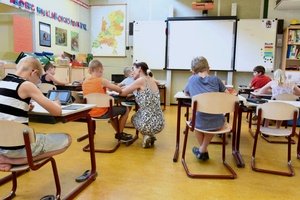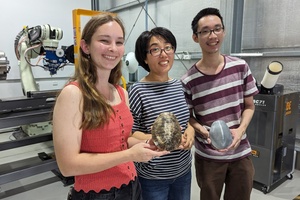In a study from the University of South Australia, researchers found that mathematics homework can sometimes cause more harm than good.
Exploring how homework policies and practices affect families, researchers found that the homework could inadvertently affect a child when it often was too difficult for a child to complete independently, and/or with the support of a parent or required significant support from parents and seeped into family time.
It also often resulted in a negative experience for the child and their parent, leading to negative associations with mathematics and potentially students’ disengagement from the subject, it generated feelings of despair, stress, and negativity among parents who were unable to help and it made students feel inadequate when they struggled with the work.
UniSA researcher, Associate Professor Lisa O’Keeffe, says such negativity around mathematics has broad implications.
“Homework has long been accepted as a practice that reinforces children’s learning and improves academic success,” O’Keeffe says.
“But when it is too complex for a student to complete even with parent support, it raises the question as to why it was set as a homework task in the first place.
O’Keefe says parents play a key role in supporting their children with schooling and homework and when children need help, their parents are often the first people they turn to.
“But many parents are unsure of the current mathematics strategies and approaches that their children are learning, as these have changed a lot since they were at school,” she says.
“Like many things, mathematics teaching has evolved over time. But when parents realise that their tried-and-true methods are different to those which their children are learning, it can be hard to adapt, and this can add undue pressure.
O’Keefe explains that when children see their parents struggle with mathematics homework, or where mathematics homework becomes a shared site of frustration for families, it can lead to negativity across generations.
“For example, we might hear adults saying things like ‘I wasn’t very good at maths, so my child won’t be either’.
“Negative interactions with mathematics, and negative discourses like these can lead to reduced confidence, reduced self-efficacy, and can negatively affect children’s resilience, persistence, and ultimately their inclination to continue with mathematics,” she says.
It’s clear that any decline in STEM subjects such as maths can have long-term impacts for Australia’s future.
Statistics show that less than 10 per cent of students are studying a higher level of maths, with maths capabilities declining more than 25 points (15-year-olds in 2022 scored at a level that would have been expected of 14-year-olds, 20 years earlier).
Co-researcher, UniSA’s Dr Sarah McDonald says the research also identified gendered biases.
“Our research showed that it was overwhelmingly mothers who were responsible for managing children’s homework,” McDonald says.
“And they often experience frustration or despair when they were unable to understand the maths problems.
McDonald explains that when mothers find maths hard, there is concern that this may demonstrate to their children, especially their girls, that this is not an area in which they would naturally excel.
“The last thing teachers want to do is disadvantage girls in developing potentially strong mathematical identities,” she says.
“We need a greater understanding of homework policies and expectations.
“The experiences of the families in our study do not support the often-quoted claim by researchers that that homework has potential non-academic benefits such as fostering independence, creating positive character traits, developing good organisational skills, or virtues such as self-discipline and responsibility.”














